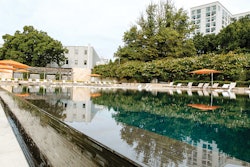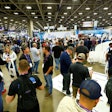
Last September, Berkeley, Calif., became the first U.S. city to ban natural gas lines in all new buildings. Since then, other cities in the state including San Jose, Oakland, Santa Rosa and Santa Monica, have passed similar ordinances, along with faraway Brookline, Mass. Numerous other counties and municipalities, mostly in California, are reportedly considering similar measures.
It’s all part of a “decarbonization” movement aimed at moving away from coal and natural gas and toward renewable energy sources such as wind, solar and geothermal. In California, as cities have adopted the 2019 California Building Codes, many have proposed enacting “Reach Codes” that amend the code requirements to mandate that all commercial construction be all electric.
Reaction from the pool and spa industry has been swift and categorically opposed, as not only gas heaters, but also plumbed gas grills and fire features would be obviated by this ban. According to a recent statement from the California Pool and Spa Association, “To be absolutely clear, these ordinances provide there will be no natural gas piped to new buildings in these areas and, in some cases, whole subdivisions. CPSA is opposed to these ‘Reach Codes’ and has weighed-in by filing comments in opposition with a number of cities that have or are considering these new statutes.”
RELATED: Pool Heater Best Practices
Far more incendiary views have been expressed on social media. It has even been privately suggested to this writer, with great force and fury, that these laws are both tyrannical and represent a threat to the industry. These impassioned objections are based on the assumption that it is grossly inefficient and costly to heat water without the use of fossil fuels. This prohibition will, one close associate of mine has said, ultimately lead to an increase in drowning because there will be fewer places to learn to swim.
Suffice to say, passions are running high on this one. Is it gas-lighting about gas? Possibly so.
HOT BUTTONS
In response to this trend, CPSA is partnering with the California Restaurant Association in a legal challenge to the Berkeley rule. (Indeed, it’s not hard to imagine that restaurants that use gas grills in their kitchens would also see this as a huge threat.)
As for the pool and spa industry in the main, it’s harder to see the cataclysmic doom and gloom. So far, these restrictions have gone into effect in extremely densely populated cities where there is very little new construction, with the exception of some areas decimated by wildfires. For now, the number of properties impacted is small, the number of potential pools and spas even smaller, and those where an electric water heater, heat pump or solar won’t do the trick are rarer still.
That said, there are facilities that need large volumes of heated water, such as hotel or resort spas, or even medical hydrotherapy facilities. And large inground custom spas, often attached to a pool, could be negatively impacted. In those situations, there is a valid question as to how to efficiently heat large bodies of water to spa temperatures without fossil fuel.
I can’t help but think about the fact that basically all portable spas are heated electrically — maybe it’s possible to further develop electric heaters to work more efficiently on a larger scale? In other words, this seems like a technical challenge that can be solved, rather than an existential threat.
PERSONAL PERSPECTIVE
While I am fully in favor of moving toward renewable energy sources, I think banning natural gas lines is a bad idea, and I don’t think it’s “sustainable.” Reason being, from a purely psychological standpoint, prohibitions almost never work. It’s basic human nature to want that which we’ve been told we cannot have. When that which is being prohibited was previously widely available and the source of convenience and affordability, taking it away is folly. In other words, prohibition is a bad tactic.
RELATED: How to Size a Pool Heater
Instead, I believe the way you move the needle toward actual sustainability is through technical advancement and affordability. LED lights and variable-speed pumps have caught on not because of some kind of government mandate, but because they’re more efficient. They’re better mousetraps and they save money. In my opinion, it’s the guys and gals in the engineering departments that can save the planet by developing more efficient ways of doing things. The halls of government necessarily lag behind, and that’s the case here.
Heating water efficiently with electricity is a technical challenge, and it’s one worth solving for places like California where kilowatt-hour costs hover near 19 cents, and that’s true whether gas lines are banned or not.








































